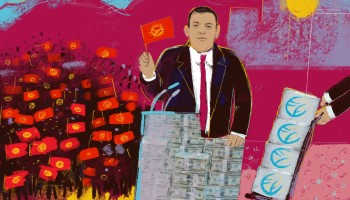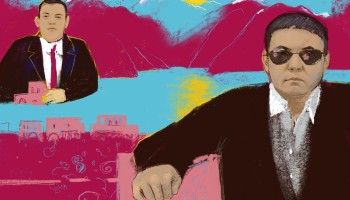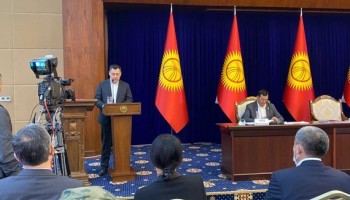The State Committee for National Security (GKNB) said on Thursday its investigation found that Matraimov had agreed to hand over another Kyrgyz property, an apartment in downtown Bishkek worth about $235,000 to the government, and that he and his relatives had no properties abroad. They offered no explanation for why a man against whom a corruption case had just been closed would surrender property.
Moreover, a previous investigation by OCCRP and its partners Radio Free Europe, Kloop, and Bellingcat found that his wife did own properties in Dubai. Those findings, part of a larger series of investigative articles called “Plunder And Patronage In The Heart Of Central Asia,” suggested that Matraimov was facilitating a smuggling scheme on the border with China and acquired properties in Kyrgyzstan and abroad which did not correspond to his official income.
Matraimov was sanctioned by the U.S. under the Global Magnitsky Act for his involvement in a scheme that funneled hundreds of millions of dollars out of Kyrgyzstan.
But he remained untouched in Kyrgyzstan despite the extensive journalistic findings of wrongdoing — until October, when the country erupted in protest following a controversial parliamentary election. Many citizens were outraged when a political party aligned with the Matraimov family won second place amid allegations of vote buying.
The new government pledged to tackle corruption, and Matraimov was finally arrested in October and pleaded guilty to orchestrating numerous corruption schemes. He also agreed to testify against his accomplices.
While in custody, Matraimov voluntarily agreed to hand over US$ 24 million in cash and properties as representing the proceeds of his corruption — including a shuttered shopping mall and nine apartments throughout Bishkek. A subsequent OCCRP investigation raised questions about this arrangement, finding that he had acquired these apartments just weeks earlier.
Following these payments, a district court ordered him to pay a US$3,000 fine and released him. He was arrested again for money laundering days later.
Thursday’s decision to close that case too allowed in the end Matraimov to go home after returning a small portion of the income he earned for participating in a scheme that funneled $700 million out of the country.






